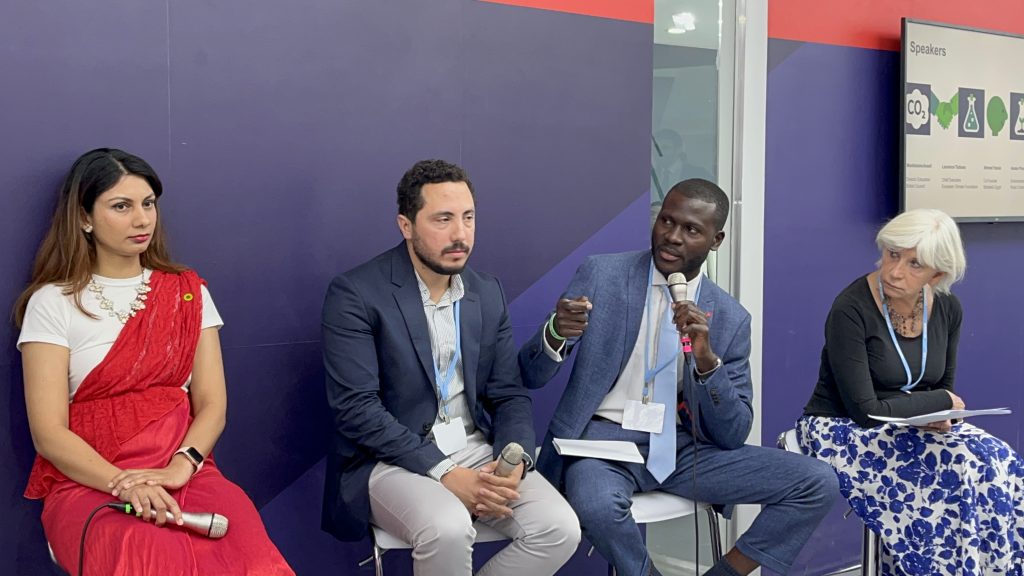On the panel chaired by Alok Sharma, COP26 President, a strong panel intervention was delivered by Damilola Oguntade, founder of the Next Gen. Global Frontier (NGGF) on the topic ‘Stronger together for the Climate’ under the theme “From the Glasgow Climate Pact to COP27: The role of youth: successes, challenges and progress”. The session had an outreach of over 500 delegates including youth and key stakeholders both in-person and virtual audience.
It is crucial to reinforce the significance of the latest United Nations Secretary General António Guterres’ report – “Our Common Agenda” – which underlies the need to listen to and work with young people in crucial decision making processes.
Similarly, Article VIII of the Glasgow Climate Pact emphasizes the need for collaboration and engagement of youth in designing and implementing climate action solutions at the local, regional and international levels.
The follow-up question to this, is – why do we need to reference these instruments and agenda? It is simply because they set the stage for collective global action on this issue of climate change. Consequently, while it is clear that international law helps to recognize and advance these climate targets from ambition to obligation, it is equally clear that more steps have to be taken to transform this obligation into actionable impact and implementation.
Damilola mentioned that one crucial way to achieving progress in this regard is through the Outcomes-Based Approach to Development adopted by the Next Gen. Global Frontier to connect specific objectives within these agreements with responsibility (via youth-led sustainability projects on the ground) for social impact. The NGGF therefore positions youth at the center of the engagement for transforming these objectives from proclamations into action. It thereby fulfils one of the core purposes of the Glasgow Climate Pact and the latest Sharm el-Sheikh Implementation Plan on collaboration with youth and indigenous communities in implementing climate action solutions.

Overall, it was an enriching panel intervention with insightful views and contributions shared alongside Laurence Tubiana, CEO, European Climate Foundation and one of the architects of the Paris Agreement; Ahmed Yassin, co-founder, Banlastics Egypt; Anoka Abeyrathne, Environmental Lead, Royal Commonwealth Society; Maddalaine Ansell, Director Education, British Council (who gave the opening remarks) and Alok Sharma MP – the honorable chair of this panel session and COP26 – UN Climate Change Conference President.
OUR KEY SUBMISSIONS
Back to the question of “how do we transform these objectives from proclamations into action with youth at the center of that engagement?” Here are our key submissions:
Action and Implementation Pathways
First, we need to move beyond consultations with youth leaders or experts to institutionalizing their agency and leadership into the relevant policy frameworks at the national, regional and international levels for accelerated climate action. The creation of the new United Nations youth office by General Assembly (GA) Resolution 76/306 and the recently launched Youth Action Plan by the European Union worth over €50 million to engage, empower and connect youth with concrete climate, energy and sustainability solutions are relevant case studies in support of this submission.
Second, the Nationally Determined Contributions (NDCs) of each State should integrate youth-led climate solutions and projects within their frameworks. This way, youth actually participate in the policy co-creation and co-implementation processes of the climate targets and sectoral plans of and with their respective governments.Lastly, the present generation of leaders must consolidate capacity-building efforts to strengthen youth leadership and preparedness for tackling present and emerging development crisis such as climate change. As Damilola noted, the responsibility of the present generation of leaders is to lead a legacy that pays (development opportunities) forward for the present and upcoming generation.

